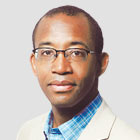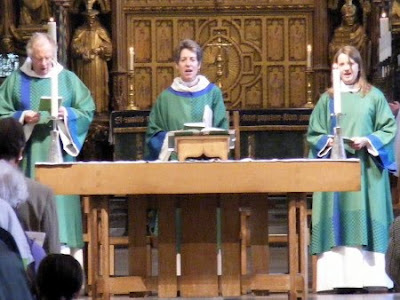Although historians will point to Gene Robinson’s consecration as a bishop in 2003 as the catalyst for the reconfiguration of global Anglicanism, Pentecost 2010 may turn out to have been a watershed of sorts too. The Archbishop of Canterbury’s Letter,
Renewal in the Spirit, and the responses to it, particular
that of Presiding Bishop ++Katharine Jefferts Schori of The Episcopal Church, have ushered in a new era not only of frank disagreement but of practical disengagement.
The Australian Church has not been central in these discussions. We have our own microcosm of Anglican diversity, which often makes us hesitant to wade into Anglican Communion wars, lest we further destabilize our own delicate or illusory balance. Where we are contributing to the broader conversation at all, it is in correspondingly contradictory ways.
Primate ++Phillip Aspinall plays a leading role in the Anglican Consultative Council, working to defend or create a centre for the global Communion; others have had significant roles in inter-Anglican bodies. Yet ++Peter Jensen and his colleagues in Sydney, our most numerous and powerful diocese, are deeply involved in the GAFCON/FCA movement, and in the self-described ‘Global South’ (one of many signs that a particular conservatism and material resources are as good a ticket in to that company as any real issue of human and political geography - ask the Brazilians, Filipinos and South Africans).
Our divisions locally are arguably as deep as those in TEC a few years ago, but we Australian Anglicans generally believe in the Church. And in case or where we do not, the Australian Anglican Church is a fairly loose confederation of autonomous dioceses (which allows our spectacular diversity) and unlike our TEC sisters and brothers we do not have a strong sense of ‘national’ Church as an important ecclesiological category.
++Rowan is also held in real affection here, even in some (not all) of the more evangelical corners of the Church. Australian Anglicans have not wanted to weaken his position, and we—even those who disagree with him more and more about the Anglican Communion and its politics—still look to him for theological leadership. After these events however, I suspect there will be an increasing number here who look to ++Katharine and others for that leadership, as well or instead. I do hope it will be ‘as well’, myself; I think ++Rowan is sometimes better at being wrong than ++Katharine is at being right. This may be another sign that they need each other, and that the rest of us need them both.
++Katharine is right, I believe, in her more expansive articulation of the Spirit’s work as ongoing and dynamic. She is also right to reject centralization as alien to our Anglican heritage and to the roots of our more modern attempts to create a Communion.
However ++Katharine’s language of colonialism and control (or the romanticized take on Celtic Christianity, pursued further in Diana Butler Bass’
comment piece) in her pastoral letter responding to ++Rowan's will be unconvincing to many outside the TEC Choir being preached to, however sympathetic some of us are to the issues involved. Excluding some from obscure inter-Anglican bodies can be depicted as more-in-sorrow-than-anger discipline by the perpetrators, or as grasp-for-power oppression by the objects, but the reality all amounts to far less.
Appeal to the specifics of the (impressive) ‘Baptismal Covenant’ of TEC as a basis for distinctive action does not cut much ice here either (granted that we were not the audience); we Australian Anglicans want to talk about the demands of our common baptism, rooted in Christ for 2000 years, and resort to what characterizes TEC in the last 30 is not reassuring. This is where our admiration for TEC’s courage and leadership pauses, recognizing an apparent self-sufficiency which we refuse to attribute to ourselves. This is both what we admire most and what we find frustrating in TEC. This is where we are not sure whether ++Katharine’s being right, or similar forms of being right, will be enough.
++Katharine is still right here, however, and ++Rowan wrong. He is wrong in a tragic way—seeking, doubtless at great personal cost, a unity in the terms that existing Anglican Communion structures assume or require, but which in fact has now escaped us.
++Rowan is wrong in identifying the TEC ‘Communion Partners’ or others ‘who disagree strongly with recent decisions’ as those who want to be aligned with the Communion’s general commitments. I believe the vast majority of the members of TEC, including its leaders, do want to be aligned with the Communion’s general commitments and are, with specific and well-known exceptions. I have no more desire than the Archbishop of Canterbury to brush past the difficulties those exceptions present; but when did attitudes to homosexuality, rather than to the Creeds or the Sacraments, come to define the ‘Communion’s general commitments’?
This is an ecclesiological as well as a theological mistake, in that it characterizes the Communion not by its vast common depth of faith and hope, framed in specific and diverse history, but by the conversations of the thin layer that constitutes the ‘instruments of unity’, whose success has of late been desultory, and future significance increasingly uncertain.
++Rowan is also wrong in equating the positions in Inter-Anglican bodies such as IASCUFO with representation of the Communion as a whole. This is precisely the sort of context where Anglicans need to have the breadth of visions and voices that might take us forward in faith and charity, even if it is to a place of mutual disagreement and realignment. The removal of a TEC member of IASCUFO makes it a weaker body in all respects.
The position is slightly different regarding exclusion of TEC from the ecumenical dialogue groups, but the result no more inspiring; our dialogue partners may indeed now have a better chance of knowing ‘who it is they are talking to’—they will know precisely that they are talking only to some of us.
And while numerous commentators have suggested there are power grabs or constitutional problems with the dis-invitations, few have noted that membership of such bodies has never before been seen as a question of delegation, or of representing national Churches; rather their members have been chosen for expertise, and with a necessary diversity that reflects our own (than you
Bruce Kaye for this point).
Not all blame, even for these specific missteps, should be laid at the feet of the Archbishop of Canterbury or of the Anglican Communion Office. It is patronising to conservatives in the 'Global South' and elsewhere to absolve them of responsibility. But here is where the singling out of TEC, at least as it appears in Canon Kenneth Kearon’s subsequent
letter, becomes inexplicable (nb., after a week or two of no clarification, maybe change ‘inexplicable’ to ‘outrageous’). Most groups who have disregarded the other moratorium, of cross-border interventions, have not been mentioned in the prescriptions for dis-inviting participation in international bodies.
This apparent inconsistency turns the events of recent weeks from depressing but inconsequential to depressing but deeply troubling. Not that it would have been much better, I hasten to add, for conservatives to be similarly sanctioned; we need these brothers and sisters no less than others, whether they know it or not. At present however many of them are seeking communion only among the superficially like-minded, and would hardly notice their or our exclusion from these structures.
From this southern vantage point, I cannot hear the events of Pentecost 2010 either as a new centralizing will-to-power or as a rallying-call to liberal or progressive indignation. Rather, in a perverse reversal of the original Pentecost, we see ourselves further reduced to Babel, scattered abroad and unable or unwilling to understand one another’s speech. If the Anglican Communion’s central instruments are bound by circumstance to provide us with less than they were intended to, Australian Anglicans will not abandon them; but we will not abandon sisters and brothers in TEC or elsewhere either, as we all begin the long slow work of finding common language by other means, in the Spirit’s power.
 I have not commented a great deal, at least directly, on the proposed "Anglican Covenant" that would, if enacted, bring about a more formal structure to our very shaggy Anglican Communion. Part of my reluctance to comment is I've read the drafts and find them overly complicated, a lawyer's dream if you will.
I have not commented a great deal, at least directly, on the proposed "Anglican Covenant" that would, if enacted, bring about a more formal structure to our very shaggy Anglican Communion. Part of my reluctance to comment is I've read the drafts and find them overly complicated, a lawyer's dream if you will.

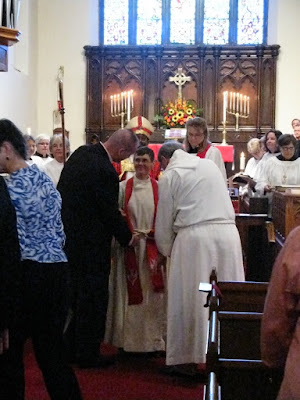



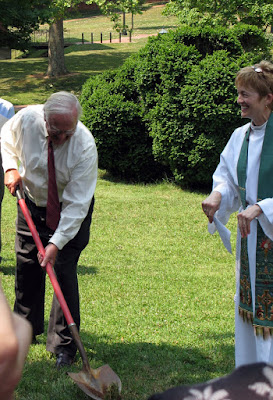
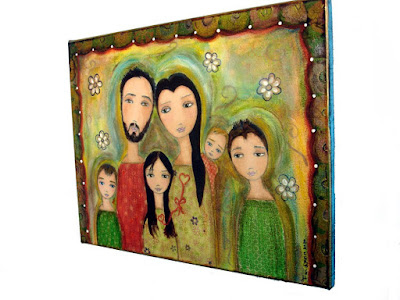


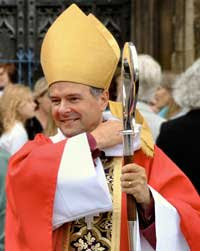

 Our American relationship with the Church of England is usually just part of the wallpaper, and on any given Sunday, most of the time it doesn’t enter into our collective church conscience. So it is particularly jarring when the tensions of that relationship do burst into the open, as it did last week when the American Presiding Bishop Katharine Jefferts Schori was asked to remove her mitre so as not to offend a contingent of the Church of England who will not accept women bishops (or, we suspect, women priests).
Our American relationship with the Church of England is usually just part of the wallpaper, and on any given Sunday, most of the time it doesn’t enter into our collective church conscience. So it is particularly jarring when the tensions of that relationship do burst into the open, as it did last week when the American Presiding Bishop Katharine Jefferts Schori was asked to remove her mitre so as not to offend a contingent of the Church of England who will not accept women bishops (or, we suspect, women priests).  In our own time, Archbishop of Canterbury Rowan Williams and his Lambeth advisers consistently misunderstand and badly underestimate our differences in polity – and how those very different ideas of church governance and secular democracy influence our respective approaches to decision-making in the life of our respective branches of Anglicanism.
In our own time, Archbishop of Canterbury Rowan Williams and his Lambeth advisers consistently misunderstand and badly underestimate our differences in polity – and how those very different ideas of church governance and secular democracy influence our respective approaches to decision-making in the life of our respective branches of Anglicanism.

